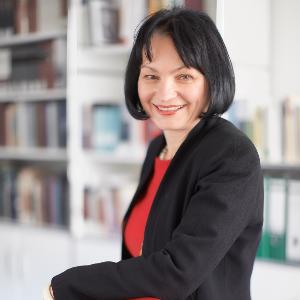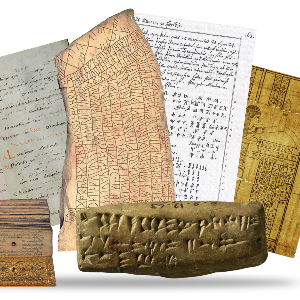Cross-Cultural Philology Cluster of Excellence: moving beyond the Eurocentric perspective in philology
22 May 2025
The new Cluster of Excellence studies philological traditions over 5,000 years to foster intercultural understanding.
22 May 2025
The new Cluster of Excellence studies philological traditions over 5,000 years to foster intercultural understanding.
The Cross-Cultural Philology cluster takes a cross-cultural approach to the study of philological practices and cultural dynamics over a 5,000-year period. The focus is on the wealth of philological traditions in the Near East and Middle East, in East Asia, on the Indian subcontinent, in North, East, and West Africa, and in Europe. By adopting a comparative cultural approach, the researchers in the cluster hope to gain insights that go far beyond the findings of previous research.
Professor Beate Kellner, Chair of Medieval German Literature at LMU Munich and spokesperson for the Cross-Cultural Philology Cluster of Excellence, explains the cluster’s focus and its objectives.
We will be taking a comparative look at philological practices around the world over a period of 5,000 years.Beate Kellner, Chair of Medieval German Literature at LMU Munich

Spokesperson for the Cross-Cultural Philology Cluster of Excellence | © Hans Herbig
What objectives are you pursuing with the cluster?
Beate Kellner: We will be taking a comparative look at philological practices around the world over a period of 5,000 years. Our aim is to develop a comprehensive history of scholarship and to move beyond the Eurocentric perspective that has largely characterised research to date. The cluster is going to be studying a significant part of the global cultural heritage and safeguarding it. The work will help to overcome the pressing social challenge of improving understanding and communication between cultures.
How do you view the social significance of the humanities disciplines involved in the cluster?
We live in an age dominated by fast, loud, and simple messages. As a contrast to this, we have philological research, which deciphers complex texts in order to preserve and explain them for humanity in the long term. This task is more topical and more necessary than ever. In the midst of today’s flood of information and the declining attention span of each individual in society, philology forms a necessary counterbalance through its approach guided by critical reading and analysis. Our cluster draws on a worldwide archive of texts, cultural achievements, and techniques spanning thousands of years. The cluster’s joint research aims to explore these cultural traditions anew from a comparative perspective.
It’s not just researchers who should have basic philological skills and powers of critical thinking, but every person in our society. In the interests of achieving this, we want to give the humanities at LMU a refresh and position them for the future in the best way we can.
We are able to build on the extraordinary diversity of philological disciplines at LMU to make the cluster an internationally unique center.Beate Kellner, Chair of Medieval German Literature at LMU Munich
What does the cluster build on and who is involved?
The cluster brings together 25 Principal Investigators and numerous Key Researchers, many of whom are international leaders in their respective research areas and have already collaborated on interdisciplinary projects. I would particularly like to highlight International Doctorate Program Philology. This pilot project has shown how fruitful our research approach is and how enthusiastically it is being taken up by early-career researchers. This experience is partly what motivated us to apply to become a Cluster of Excellence.
Researchers from seven LMU faculties are involved in the Cross-Cultural Philology Cluster, as well as one colleague from the University of Würzburg. We are able to build on the extraordinary diversity of philological disciplines at LMU to make the cluster an internationally unique center. The range of subjects extends from Assyriology and Egyptology to Greek Philology and Sinology, to name just four disciplines.
The cluster’s research covers a period of 5,000 years and focuses on numerous cultures. How is the work structured?
The cluster is divided into five research areas and three transversal perspectives that address overarching issues and objectives. We have also developed a network of different forms of collaboration that spans the entire cluster. We are going to establish a number of working formats such as annual working groups, regular meetings and panels with international participants. There will be summer schools and master classes for early-career researchers, for example.
We will examine how philological practices were embedded in different cultures, religions, ethnicities, and legal and political systems.Beate Kellner, Chair of Medieval German Literature at LMU Munich

© Stefan Pörtner
Can you give us an example of the type of questions you will be answering?
Part of what scholars in the Writing Systems research area are studying is how writing systems developed and spread in different cultures, how they were linked to different forms of knowledge, and why they sometimes disappeared again.
How do you deal with the diverse range of research questions in the cluster?
Diversity is at the heart of our research project. We will examine how philological practices were embedded in different cultures, religions, ethnicities, and legal and political systems. These thematic aspects of diversity will also be reflected in the cluster’s structure.
Are you also planning some formats for science communication?
We will establish a range of digital publication formats and outreach measures to communicate our research findings not only to the scientific community but also to the broader public. Among these will be public lectures series, Massive Open Online Courses, philological training courses for teachers, a science blog, and podcasts. And of course, we will also be present on social media.
What role do digital technologies play for the research happening in the cluster?
We will be integrating methods and approaches from the digital humanities into our research. This will make it possible to make texts and the data associated with them available long term, for example, and to compare them with each other and investigate them using machine learning approaches. We are able to build on a very good infrastructure at LMU, which includes the Leibniz Supercomputing Center, the Humanities IT Group, and the services of the University Library.
We will take the philological and digital skills applied in the cluster and pass them on to the next generation of researchers, as well as to teachers, students, and schoolchildren, and disseminate them throughout society.
Researchers from various disciplines work together in all of the research areas within the cluster. They study philological practices and cultural dynamics over a period of around 5,000 years and explore the richness of philological traditions from a comparative cultural perspective.
„Writing Systems“:
How are writing systems related to the development and transmission of knowledge, to political and socio-cultural factors, to trade networks and administrative practices? And how do they influence the formation of communal identities and the rise and fall of empires? These are the questions that scholars in the Writing Systems research area are addressing.
„Practices in the Layout, Preservation, and Archiving of Texts“:
In the context of philological work, texts are also considered in terms of their materiality and mediality. They exist, for example, as cuneiform tablets from Mesopotamia, as Egyptian papyri, as inscriptions on stone, as handwritten codices, or as prints. Scholars working in this research area will therefore also examine the layout of the surviving texts as well as the connection between texts and paratexts and between texts, illustrations and diagrams.
„Practices of Editing”:
Scholars in the Practices of Editing research area will examine the history of editorial practices in an intercultural comparison and at the same time develop new methods in this field. In doing so, they will make use of the new possibilities opened up by the technologies within the digital humanities.
„Texts and Commentaries, Canon Formation, and Censorship”:
At the heart of the Texts and Commentaries, Canon Formation, and Censorship research area are the processes of canon formation and their entanglement with the selection, correction, translation, dissemination, and censorship of texts. The scholars also plan to take a comparative look at the relationship between texts and commentaries across different cultures.
„Migration and Translation of Texts“:
The migration of texts interests scholars in the Migration and Translation of Texts research area in a number of ways: they study how texts were moved across place, time, and media. They examine practices of textual adaptation, translation, retextualisation, summarisation, and abridgement, as well as the possible changes that these can bring about.